Zoom
Trash

Tired light. Tired light is a class of hypothetical redshift mechanisms that was proposed as an alternative explanation for the redshift-distance relationship.
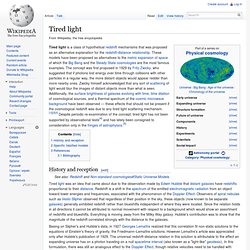
These models have been proposed as alternatives to the metric expansion of space of which the Big Bang and the Steady State cosmologies are the most famous examples. The concept was first proposed in 1929 by Fritz Zwicky, who suggested that if photons lost energy over time through collisions with other particles in a regular way, the more distant objects would appear redder than more nearby ones. Zwicky himself acknowledged that any sort of scattering of light would blur the images of distant objects more than what is seen. History and reception[edit] Basing on Slipher's and Hubble's data, in 1927 Georges Lemaître realized that this correlation fit non-static solutions to the equations of Einstein's theory of gravity, the Friedmann–Lemaître solutions. Specific falsified models[edit] where. Crystal River - The most beautiful river on earth [Pics]
Cano Cristales - Crystal River.
![Crystal River - The most beautiful river on earth [Pics]](http://cdn.pearltrees.com/s/pic/th/crystal-river-beautiful-earth-12588167)
River of five colors, as the locals call it, originates in the south of the mountain chain Macarena, Colombia, and flows eastward to its confluence with the Guayabero river. In the Cano Cristales found five colors: yellow, blue, green, black and red. All of them are waste product of many algae and, depending on time of year, color saturation, or weakened or strengthened.
Share on Tumblr.
Enigmas. DEJA VU. Quantum Life. The Quantum Life Model The quantum life model rests on a number of mechanisms in living systems, coupled with the properties of the quantum field.
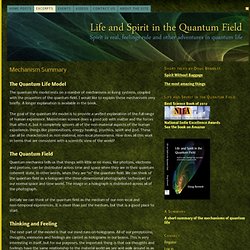
I would like to explain those mechanisms very briefly. A longer explanation is available in the book. WAVE the theory of everything ! Libertarianism (metaphysics) The term "libertarianism" in a metaphysical or philosophical sense was first used by late Enlightenment free-thinkers to refer to those who believed in free will, as opposed to determinism.[9] The first recorded use was in 1789 by William Belsham in a discussion of free will and in opposition to "necessitarian" (or determinist) views.[10][11] Metaphysical and philosophical contrasts between philosophies of necessity and libertarianism continued in the early 19th century.[12] Explanations of libertarianism that do not involve dispensing with physicalism require physical indeterminism, such as probabilistic subatomic particle behavior – theory unknown to many of the early writers on free will.
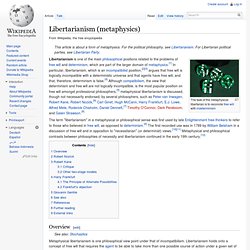
Libertarianism (metaphysics) Determinism. Determinism is the philosophical position that for every event, including human action, there exist conditions that could cause no other event.

"There are many determinisms, depending upon what pre-conditions are considered to be determinative of an event. "[1] Deterministic theories throughout the history of philosophy have sprung from diverse and sometimes overlapping motives and considerations. Phenomenology. Phenomenology may refer to:
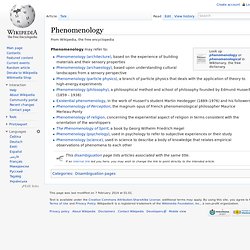
Continental philosophy. It is difficult to identify non-trivial claims that would be common to all the preceding philosophical movements.
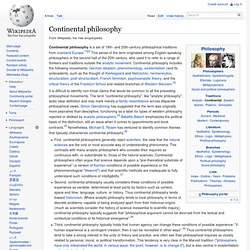
The term "continental philosophy", like "analytic philosophy", lacks clear definition and may mark merely a family resemblance across disparate philosophical views. Simon Glendinning has suggested that the term was originally more pejorative than descriptive, functioning as a label for types of western philosophy rejected or disliked by analytic philosophers.[4] Babette Babich emphasizes the political basis of the distinction, still an issue when it comes to appointments and book contracts.[5] Nonetheless, Michael E. Rosen has ventured to identify common themes that typically characterize continental philosophy.[6] Ultimate reality. A swastika (Sanskrit: "It Is the Good") drawn by the rotation of the seven stars of the Big Dipper and Ursa Minor around the pole star, in the four phases of a day.
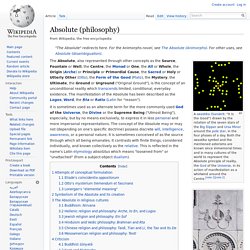
Simulated reality. Simulated reality is the hypothesis that reality could be simulated—for example by computer simulation—to a degree indistinguishable from "true" reality.
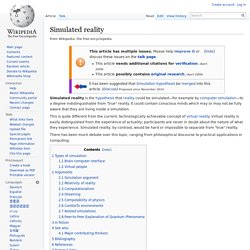
It could contain conscious minds which may or may not be fully aware that they are living inside a simulation. This is quite different from the current, technologically achievable concept of virtual reality. Virtual reality is easily distinguished from the experience of actuality; participants are never in doubt about the nature of what they experience. Simulated reality, by contrast, would be hard or impossible to separate from "true" reality. There has been much debate over this topic, ranging from philosophical discourse to practical applications in computing.
Are Ufo's Real? UFO. Evidence. Societies. Alien. Hyperreality. In semiotics and postmodernism, hyperreality is an inability of consciousness to distinguish reality from a simulation of reality, especially in technologically advanced postmodern societies.
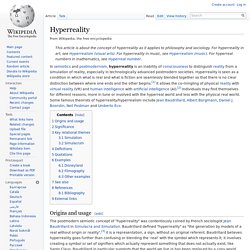
Hyperreality is seen as a condition in which what is real and what is fiction are seamlessly blended together so that there is no clear distinction between where one ends and the other begins.[1] It allows the co-mingling of physical reality with virtual reality (VR) and human intelligence with artificial intelligence (AI).[2] Individuals may find themselves for different reasons, more in tune or involved with the hyperreal world and less with the physical real world. Some famous theorists of hyperreality/hyperrealism include Jean Baudrillard, Albert Borgmann, Daniel J. Boorstin, Neil Postman and Umberto Eco. Origins and usage[edit]
Astronomy. Physical Science. Hyper Physics. Consensus reality. Consensus reality[1][2] is that which is generally agreed to be reality, based on a consensus view. The difficulty with the question stems from the concern that human beings do not in fact fully understand or agree upon the nature of knowledge or ontology, and therefore it is not possible to be certain beyond doubt what is real.[3][4] Accordingly, this line of logic concludes, we cannot in fact be sure beyond doubt about the nature of reality. We can, however, seek to obtain some form of consensus, with others, of what is real. We can use this consensus as a pragmatic guide, either on the assumption that it seems to approximate some kind of valid reality, or simply because it is more "practical" than perceived alternatives.
Anti-realism. Anti-realism in philosophy[edit] Michael Dummett[edit] , without being able to produce any term.
Reality. Reality Reality is a consciousness program (hologram, simulation, illusion, dream) created by digital codes. Numbers, numeric codes, define our existence and experiences. Human DNA, our genetic memory, triggers (remembers) by digital codes at specific times and frequencies as we experience. Those codes awaken the mind to the change and evolution of consciousness.
The brain is an electrochemical machine (computer) that processes through binary code zeroes and ones that create patterns of experiences and realities. Time.